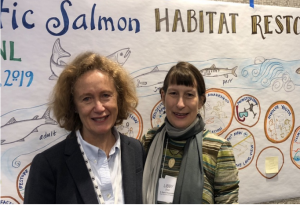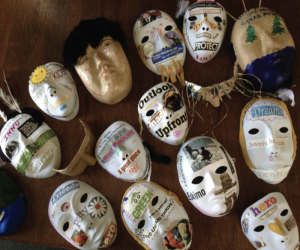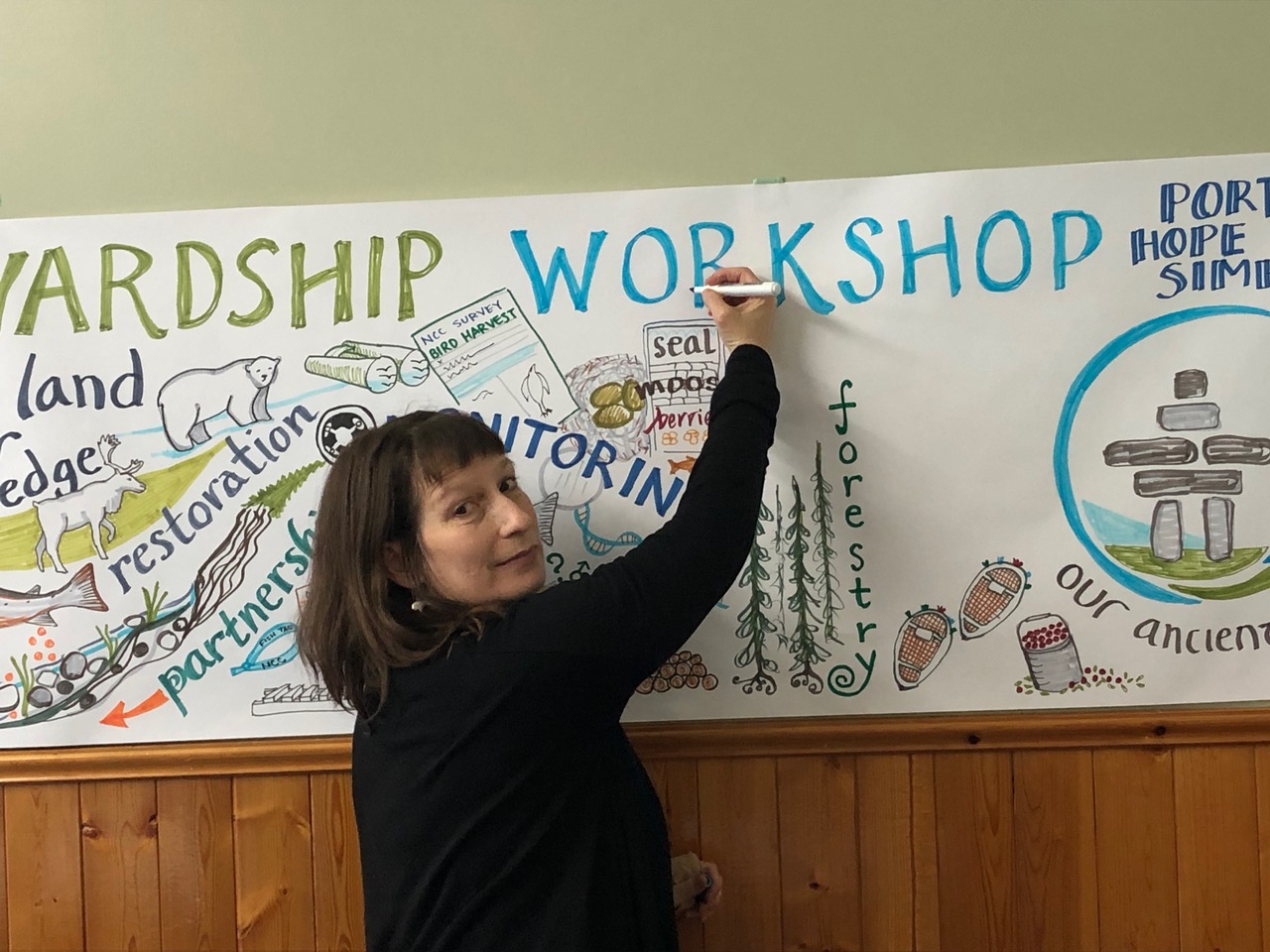Libby is a researcher and visual notetaker on a range of environmental, social, and Indigenous projects. She loves listening to people’s stories, the value of which was strengthened by her
experiences as a QLF Intern in Labrador more than twenty years ago.
QLF Experiences
International Youth Conservation Exchange, North America and the U.K., 1988
Partners in Learning Oral History Project, Labrador Straits, 1997
Waste Management Intern, Nain, Labrador, 2000, 2001
Clive Wishart Award recipient, 2001
Clean Air Project, Nain, Labrador, 2002

Libby Dean (right) and Kath Blanchard in front of Libby’s visual notes at the Atlantic Salmon Habitat Restoration Workshop, St. John’s, Newfoundland , 2019 PHOTOGRAPH COURTESY OF LIBBY DEAN
A love for listening ~
About five years ago, Libby Dean found herself wondering “What’s a kid from New Jersey doing on the back of a snowmobile… in Labrador?” She had been invited by QLF Alumna and biologist Patricia Nash to take visual notes for workshops with Indigenous communities on human-polar bear interactions, and she found herself whizzing around Labrador on a snowmobile, with Magic Markers tucked into her parka to keep them from freezing. Visual notetaking, also called graphic recording, involves live drawing the proceedings of meetings or workshops and this specific project embodies many aspects of Libby’s life—her passion for understanding human-environment relationships, love for listening, and strong connection with Indigenous communities in Labrador.
As a researcher specializing in environmental, social and Indigenous issues, Libby’s roles often focus on reconciliation between Indigenous and non-Indigenous groups and more broadly, “communities, conservation, and livelihoods”. One of her current roles involves investigating how people in the medical field, from educators to practicing doctors, can be better allies to Indigenous medical practitioners. Libby has also been interviewing people in coastal Nova Scotian communities on how to best create a more resilient future in relation to everything from climate change to rural internet and cell phone service. Much of her interview and research work harkens back to her love for listening, “hearing people’s… genuine stories”. In all of her positions, Libby strives to bridge the gap between local communities, researchers, developers, and policy-makers. The polar bear project in Labrador was Libby’s first foray into visual notetaking in communities, since then, she has created visual notes for a wide array of organizations and purposes, from a tire factory in Nova Scotia to Indigenous communities discussing issues of wildlife conservation and harvest practices.
Libby especially enjoys making visual notes in Labrador, because the murals she creates for workshops and meetings stay within the Indigenous communities. “It’s about the community looking at the poster and saying ‘Oh, I see my question there’ or’ I see the thing I learned is there’, or ‘the boat I use is in that picture, so I feel like this is relevant to me’”.
Born by the Atlantic Ocean, Libby first visited Labrador while on the Audubon Expedition Institute, an experiential learning program she participated in during both her high school and college years. Prior to the Institute, she had already developed an appreciation for nature, growing up in the woods and spending a lot of her time playing outdoors. What Libby most enjoyed about experiential learning was being immersed in new places and cultures by speaking with locals, hearing stories of “what it is to be Hopi… or what it’s like to live in these tiny communities in Labrador and fish for a living.” She didn’t know then that Labrador communities would become a thread woven throughout her life.

Masks made by Inuit, Innu, NunatuKavut, and settler women in Labrador during a creative action research project coordinated by Libby Dean PHOTOGRAPH COURTESY OF LIBBY DEAN
Libby first came into contact with QLF through her participation in the International Youth Conservation Exchange between Scotland and the U.S., in 1988. Her first internship with QLF brought her back to the Labrador Straits to assist with the Partners in Learning Oral History Project. She stayed with a family in Red Bay, Labrador and traveled around the community on snowshoes and skis, conducting interviews with community members about everything from midwifery to fishing tall tales.
Libby returned to Labrador – this time the northernmost community of Nain – as a QLF Waste Management Intern for two summers. She figures she has returned to Labrador at least eighteen times, with and without QLF, for her master’s thesis research and various other community and research projects.
Libby’s QLF experiences taught her the fundamentals of venturing into a new setting and building programs from the ground up: “Ultimately the community tells you what they need. That’s why taking the time to listen to people’s experiences is so important”. These QLF experiences helped give her the skills to become a strong leader and a compassionate listener, and she uses these tools in her work every day.
Libby’s lifelong love of Labrador and the relationships forged there were, in many ays, because of QLF. She remembers a few years ago, standing and surveying a hydroelectric project at Muskrat Falls with a potentially harmful impacts on the local people and region, with QLF Alumni Andrea Procter and Patricia Nash when she suddenly grasped the significance of the transformative power of QLF. “There were three strong and capable women standing there whose lives revolved around Labrador because of their early QLF experiences,” she says. “It’s the power of the type of experience you can have at QLF. It can be life-changing.”






